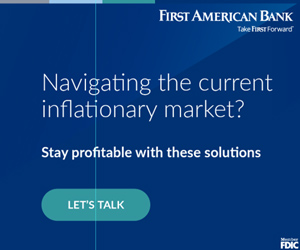Skyrocketing inflation continues to disrupt industries all over the world, affecting consumers and businesses alike. In May, inflation jumped to 8.6%—the highest, most rapid increase since 1981. Businesses now have to not only manage outgoing expenses—from material costs to labor—but also maintain profitability in the face of input costs rising more than they have in decades. For companies that have debt associated with establishing their Employee Stock Ownership Plan (ESOP), this presents a specific challenge. Because floating rate loans fluctuate with market conditions, they carry a certain level of unpredictability. 
In this environment, it’s crucial for businesses to take steps to lock in costs or lower your exposure to higher interest debt. Here are three key strategies that can help you navigate the current market, minimize future risks, and invest in your continuous growth.
- Interest rate swaps: An interest rate swap allows borrowers to convert a floating rate loan to a fixed rate. That’s why swaps are among some of the most popular hedging offerings, as they can be executed efficiently while also providing flexibility. With swaps, borrowers can lock in rates for a longer term than traditional fixed rate loans. It’s recommended that business owners hedge a portion of their total ESOP debt so they are not completely exposed to floating rates, which might lead to unexpected future costs. That way, businesses have a more predictable cash flow, allowing them to better plan for future growth opportunities, repurchase obligation payments, etc.
- Refinancing seller notes: If existing seller notes are at an above-market rate, you can lock in costs by simply refinancing them. This not only gives current selling shareholders access to some cash, but also helps cut the company’s interest costs by allowing the original selling shareholders to exit by cashing out. In turn, the company will not have to pay ongoing costs such as salary and benefits of a former shareholder who is no longer active in the business, saving more money in the process.
- Early warrant termination: With early warrant termination, business owners may be able to provide selling shareholders with extra cash-out while cutting off future growth of that expense, providing some certainty for planning purposes. For instance, if their stock price rises quickly, terminating a warrant preserves value for existing employees while reducing long-term costs for the company itself.
Maintain Profitability with a Strong Financial Solution
First American Bank has a dedicated team that develops tangible solutions for companies with ESOPs. We strive for a financial partnership that helps businesses discover and pursue profitable growth—even amid rising prices. From our representation by the National ESOP Finance Committee, to being ESOP owners ourselves, First American Bank is actively involved in the ESOP community—and deeply familiar with the business needs of our customers.
In collaboration with our commercial teams specializing in business solutions, our ESOP team can help implement strategies to help your business grow, especially when it comes to programs that help retain and attract top employees. As you move through a challenging economic period, we will ensure that you have the support you need to succeed—today, and well into the future.
Get the right financial solutions put in place. Connect with First American Bank.














